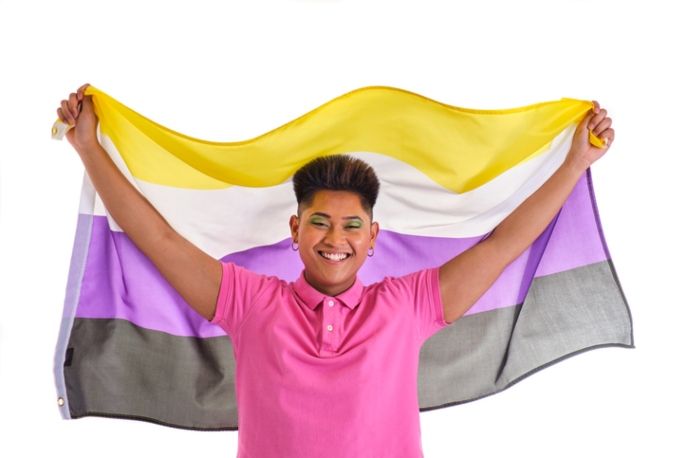Photo Credit: Alvaro Moreno Perez
This past Sunday, July 14th, was International Non-Binary People’s Day. Celebrated each year halfway between International Women’s Day (March 8th) and International Men’s Day (November 19th), Non-Binary People’s Day is an opportunity to celebrate and advocate for the nonbinary community around the world.
In 2012, Katje van Loon wrote a blog post about wishing there was an International Non-Binary People’s Day, and since then awareness and celebration around the holiday has only grown. Non-Binary people and identity have become increasingly visible, with 1.2 million people in the US identifying as non-binary and 26% of US adults (primarily younger adults) knowing someone who uses gender-neutral pronouns.
Being an ally to non-binary people, along with the rest of the LGBT+ community, is not just a good moral stance. It’s also good for business. Allies (63% of millennials) to the LGBT+ community are 72% more likely to accept a job at an organization that supports LGBT employees. With non-binary, gender non-conforming, and trans employees experiencing hiring discrimination, pay inequity, and workplace harassment, employers have much room to grow to become the type of space that the vast majority of incoming applicants would like to work for. In this blog, we will be discussing ways that employers can stand by their non-binary colleagues.
Use Gender-Neutral Language and Personal Pronouns In-Office and Through Paperwork
For non-binary, gender non-conforming, and trans people, it is an important sign of respect to refer about and them with the pronouns that they most strongly identify with. When we address or instruct a group with binary language, we run the risk of alienating or ostracizing non-binary colleagues. Narrowing gender identification and honorific options to only represent binary gender expression also contributes to that feeling of alienation. Communicate with your supervisors, human resources representatives, and other coworkers that gender-neutral language and using personal pronouns in-office and through paperwork is a company-wide expectation.
Develop Relationships with Local LGBT Centers
Whether someone has just figured out their gender identity, or they have been comfortably identifying as they are for years, at every phase of their journey a non-binary, gender non-conforming, or trans person will be looking for spaces that truly understand them. Developing relationships with your local LGBT center is just one way to not only become affiliated with the community, but also provides you an in-community resource to refer your non-binary colleague to that can help meet their needs.
Lay Out a Gender-Inclusive Dress Code
Another crucial form of gender expression is dress code. If your organization has a dress code, expand it to allow your colleagues to dress in a manner fitting their identity while still being appropriate for your work environment.
Create Equitable Bathroom Policy
Everyone at work should reserve the right to use the restroom without self-consciousness or fear of harassment. Out & Equal Workplace Advocates recommends in their publication Best Practices for Non-Binary Inclusion in the Workplace the following tips to employers:
– Office management should determine if there are opportunities to include gender-neutral restrooms in your building
– If companies have single staff restrooms, consider converting them to all-gender facilities.
– Utilize the ADA-compliant signage that doesn’t reinforce gender binaries, such as an image of a toilet in lieu of gendered pictograms.
Update & Enforce an Inclusive Anti-Harassment Policy
With so many non-binary people experiencing harassment at work, current employees and incoming non-binary applicants need to be confident that their employers will take their reports of harassment seriously. Emphasize to all of your colleagues that no one should be made to feel unwelcome at work, and that any harassment regarding a person’s gender identity will not ever be tolerated. For further guidance, we recommend looking into the Equal Employment Opportunity Commission’s 2024 Enforcement Guidance on Harassment in the Workplace, which delves into LGBT workplace harassment.
Collaborate with Non-Binary Colleagues to Address Their Needs
The most important thing you can do for your colleagues of any gender, sex, race, ethnicity, or disability, is to never presume. Create an open line of communication, imparting to everyone on staff that you are a safe space to go to for making the workplace equitable to all. There may be areas for improvement that you don’t see, and that’s ok! As long as you listen with an open mind, you and your colleague can work together to identify exactly how to make your work environment a place that caters to all.
Have a RALIANCE Policy Review
Consider reevaluating your policies and procedures to uncover how your organization currently handles gender minorities who work there. RALIANCE would be proud to work with you to find ways to modify your policies and procedures to make them more equitable to all your colleagues.
While International Non-Binary People’s Day has come and gone, the need to shape a culture that accepts them is still there. This day and every day, let’s work towards making our workspaces and communities welcoming of every gender identity!
RALIANCE is a trusted adviser for organizations committed to building cultures that are safe, equitable, and respectful. RALIANCE offers unparalleled expertise in serving survivors of sexual harassment, misconduct, and abuse which drives our mission to help organizations across sectors create inclusive environments for all. For more information, please visit www.RALIANCE.org.

